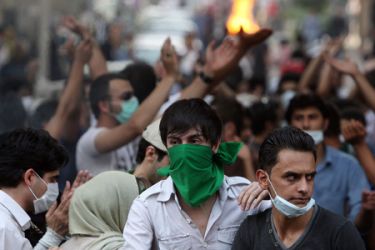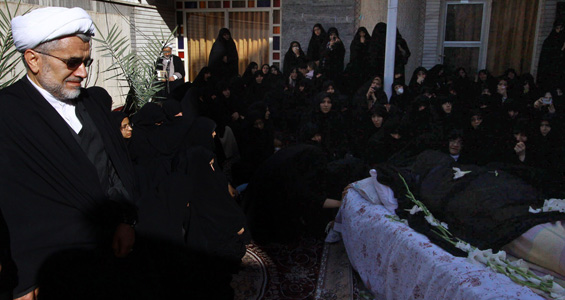‘Time for support, not sanctions’
To support the Iranian opposition, the West must not threaten the regime, author says.

 |
| Could the death of Grand Ayatollah Montazeri be a turning point for Iran? [GETTY/GALLO] |
Last week, I wrote in my blog that the death of the dissident cleric Grand Ayatollah Hossein Ali Montazeri, just like the death of Chinese leader Hu Yaobang in 1989, could portend a decisive new development in the national struggle between Iranian hardliners and reformers.
And Iran now seems to have entered a very dangerous period in which either the best or worst could happen.
This is Eastern Europe just before the wall fell. It is South Africa just before P.W. Botha decided that he must cede power to avoid a civil war and national bloodbath. It is 1992 and Boris Yeltsin facing down the tanks prepared to overthrow the regime.
But it could also be China just before the Tiananmen Square crackdown. The only difference being that China had a relatively unified government under Deng Xiaoping while Iran’s power is much more fragmented and chaotic – I doubt there is a unified Iranian command that can overwhelm the opposition in much the same way the Chinese government did after the massacre.
Losing credibility
The death of Seyyed Ali Mousavi, opposition leader Mir Hossein Moussavi’s nephew, allegedly at the hands of regime operatives indicates that even the regime loyalists have begun to lose their bearings.
It is precisely these types of lunatic gestures by those in nominal power which will drive the few remaining Iranians who support them away in disgust.
 |
| Iranians living abroad have come out to support opposition protesters [GALLO/GETTY] |
The government’s “theft” of the body and its nervy warning to the family not to mourn his death is far beyond cruel, and will redound to the shame of those who performed this vile deed.
And the regime’s eager embrace of violence against protesters during the nation’s foremost religious holiday, when any form of violence is normally eschewed in commemoration of the violence committed against Imam Hussein, Shia Islam’s holiest martyr, indicates that the regime is becoming unmoored.
“This is the month of blood. Yazid will fall,” the protesters shouted, equating the current Iranian regime with the ruler who ordered Imam Hussein’s killing, thereby boldly appropriating religious imagery in order to destroy the government’s claim to religious authenticity.
While the opposition has not, thus far, been able to mount a knockout blow to the regime, by employing tactics like this they are clearly growing more sophisticated in their attempts to undermine its credibility among those who maintain its power and legitimacy.
No time for threats
At this time it is simply ridiculous for the US and its Western allies to be contemplating punitive actions against Iran.
The situation there is simply far too volatile and it would be exploited by the regime to denounce its opponents and thereby preserve power.
The US response to the events in Iran must be restricted to supporting the concept of human rights and denouncing those violations that have occurred. This will speak louder about what the US’ true priorities are than any threats of punitive action.
If the US mucks about with sanctions or, God forbid, plays with fire by calling for armed force against Iran over its nuclear programme, it is simply playing into the hands of those it hates and undermining those it supports.
There are those in the Israeli government and among the neocons in the US who do not believe there is any difference between radical leaders and reformers in Iran. As far as they are concerned it is foolish to make a distinction or to modulate policy to benefit one side or the other.
But this attitude is a deeply pernicious and wrong-headed one which must be rebutted strenuously.
That is why the New York Times’ editorial decision to publish Alan Kuperman’s op-ed calling for blood against Iran as the only way to solve the nuclear crisis is so troubling.
This is precisely what the policy debate does not need to entertain as it will prove disastrous to the US’ own interests as well as to Iran’s.
Richard Silverstein writes the Tikun Olam blog dedicated to Israeli-Arab peace. He also publishes at Comment is Free, Alternet, the Huffington Post, Seattle Times, Jewish Forward and Haaretz.
The views expressed in this article are the author’s own and do not necessarily reflect Al Jazeera’s editorial policy.